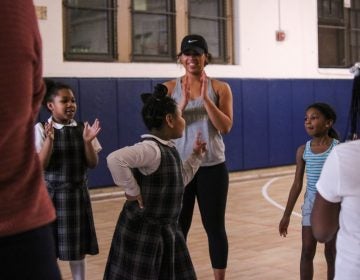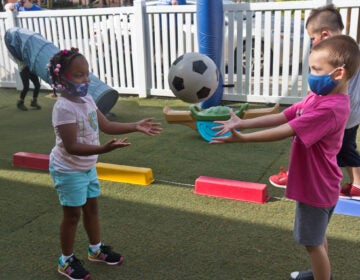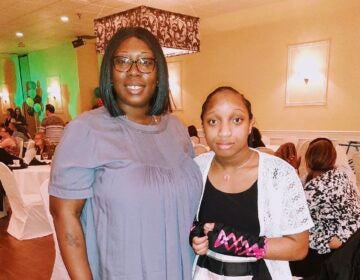Young and fit: How to build healthy bodies? Do it as a family
Promoting children’s wellness is more complex than exercise and good food, experts say: “It's not about the scale moving, it's about your mindset changing.”
Listen 3:15
Faith Green practices setting volleyballs at a sports clinic through Philly Girls in Motion. (Angela Gervasi for WHYY)
What helps children thrive? What keeps them healthy and fit? What gets them ready for the future? This year, WHYY is dispatching reporters to ask those questions.
When Faith Green finishes volleyball practice after a long day of school, she’s proud.
“And a little tired. But then I feel better, and I remember all the times when I hit the ball,” she said.
Faith already plays soccer. She plans to start lacrosse with Philly Girls in Motion, a local nonprofit that offers sports and fitness programs.
“She’s also a dancer,” added her mother, Corinne Green. “I don’t know if she told you this, but she does all different types of dance.”
The 8-year-old had just spent the evening setting volleyballs at the Edward O’Malley Athletic Association, a high-ceilinged gymnasium in Pennsport. Her T-shirt proclaimed, in shiny pink letters, “I got it from my Mama.”
Mother and daughter exercise together. Long before Faith was old enough for sports, Corinne Green joined Black Girls Run, jogging as she pushed Faith in a stroller.
“Faith and I have been together in activities since the womb,” Corinne said.
These days, they sift through online exercise videos — moving along to step aerobics or strength training with small hand weights. The videos are helpful for Corinne, a professor at Cheyney University.
Even if the day is hectic, she can squeeze in a workout with her daughter.
Faith, her mother said, “is a bit of a tough trainer…”
‘Joyful activities’
The Greens’ fitness routine is something health professionals encourage: exercising as a family.
“We have to remember that exercise is not just getting on the StairMaster,” said Laurel Weaver. “Exercise is walking the dog, and playing basketball, and throwing a Frisbee. You know, doing joyful activities.”
Weaver is a child psychiatrist at Children’s Hospital of Philadelphia, and she co-directs CHOP’s eating-disorder program.
Saba Khan works as a physician at the Healthy Weight Program, a clinic at CHOP for children living with obesity. Like Weaver, Khan stressed the benefits of exercising together, and finding different ways to do so.
She tossed around examples: using a stairway for a cardio circuit; plugging a dance game into a PlayStation. Moving together can mean a lot, Khan said.
“Because ‘together’ means that now there is accountability,” she said. “So even if Tommy doesn’t want to do it, Mom will say, ‘No, come on, we should.’ ”
Khan meets with children and their families once a month. Though the meetings revolve around the child, whose age can range from 2 to 21 years, she tries to encourage lifestyle changes for the entire family.
Some might equate obesity treatment with weight loss, but Khan urges families not to see it that way. She cautions families against using the words “fat,” “chubby,” or even “thin.” Instead, she guides children into focusing on their energy and confidence levels — and how those might improve with healthy eating and exercise.
“It’s not about the scale moving, it’s about your mindset changing,” she said.
Sometimes, the changes come slowly. Families build momentum in the pursuit of a healthier lifestyle for their children. But sometimes, the momentum stalls. Khan has seen families make progress, then slip away for months or even years.
“And when things stabilize, they come back to us,” she said.
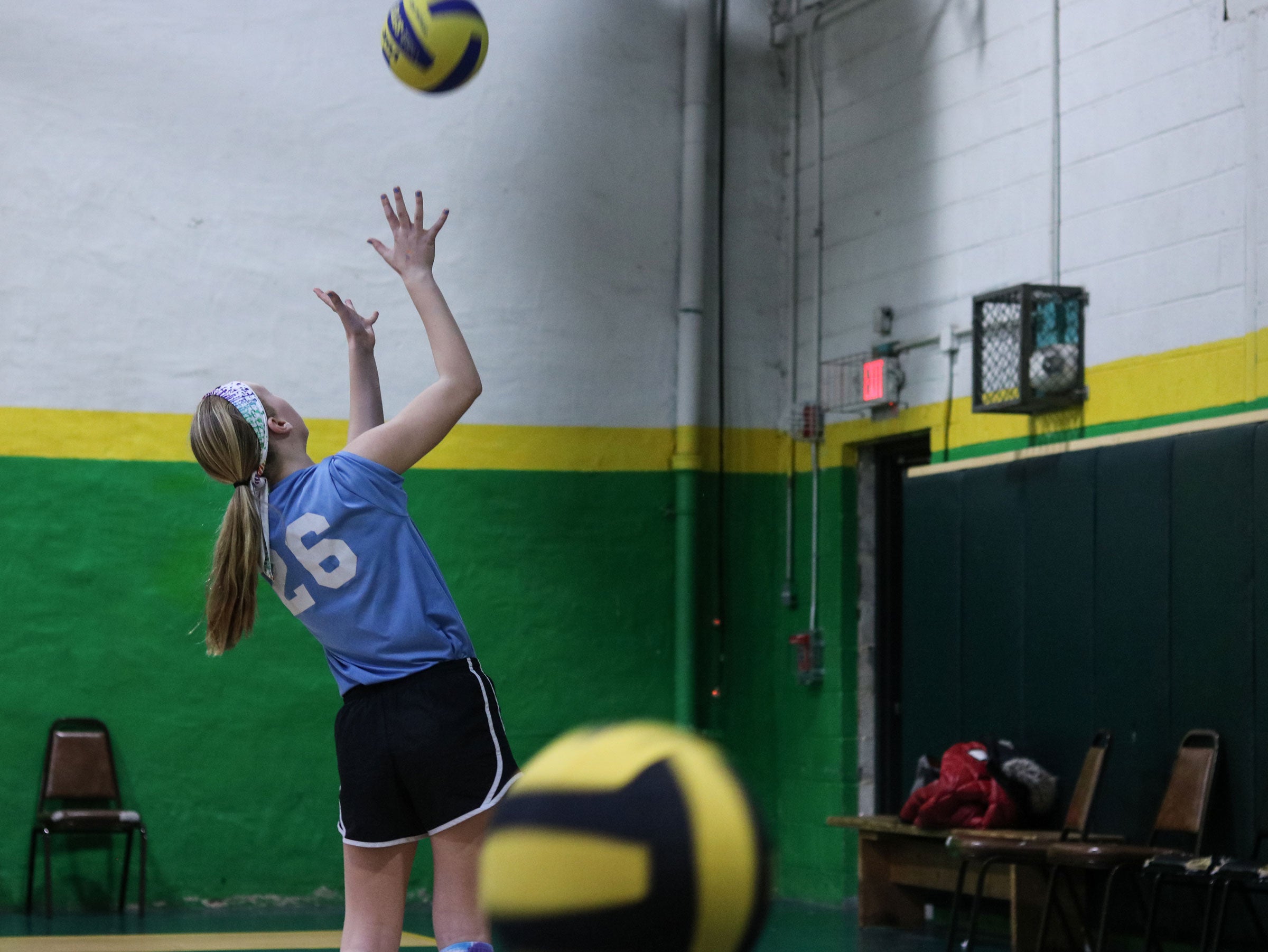
Childhood obesity remains a problem affecting one in five Philadelphia children. Khan feels especially frustrated when people place the blame on the families themselves.
It’s a far more complex issue — one that can be linked to early childhood trauma, food insecurity, or life in a neighborhood shaken by violence, she noted. And those factors often overlap.
That’s why CHOP’s Healthy Weight Program doesn’t just look at obesity as a clinical issue. The initiative includes a few dozen team members, including behavioral-health professionals such as social workers and psychologists.
“Our work is still to be done,” Khan said. As she spoke, the gentle hum of a refrigerator reverberated through the room — CHOP’s food pharmacy, which launched in September.
Now, when families visit the Healthy Weight Clinic, CHOP can screen them for food insecurity and offer a three-day supply of groceries. The “pharmacy” might provide anything from kale and onions to canned tuna fish and garbanzo beans (which come with a recipe for hummus).
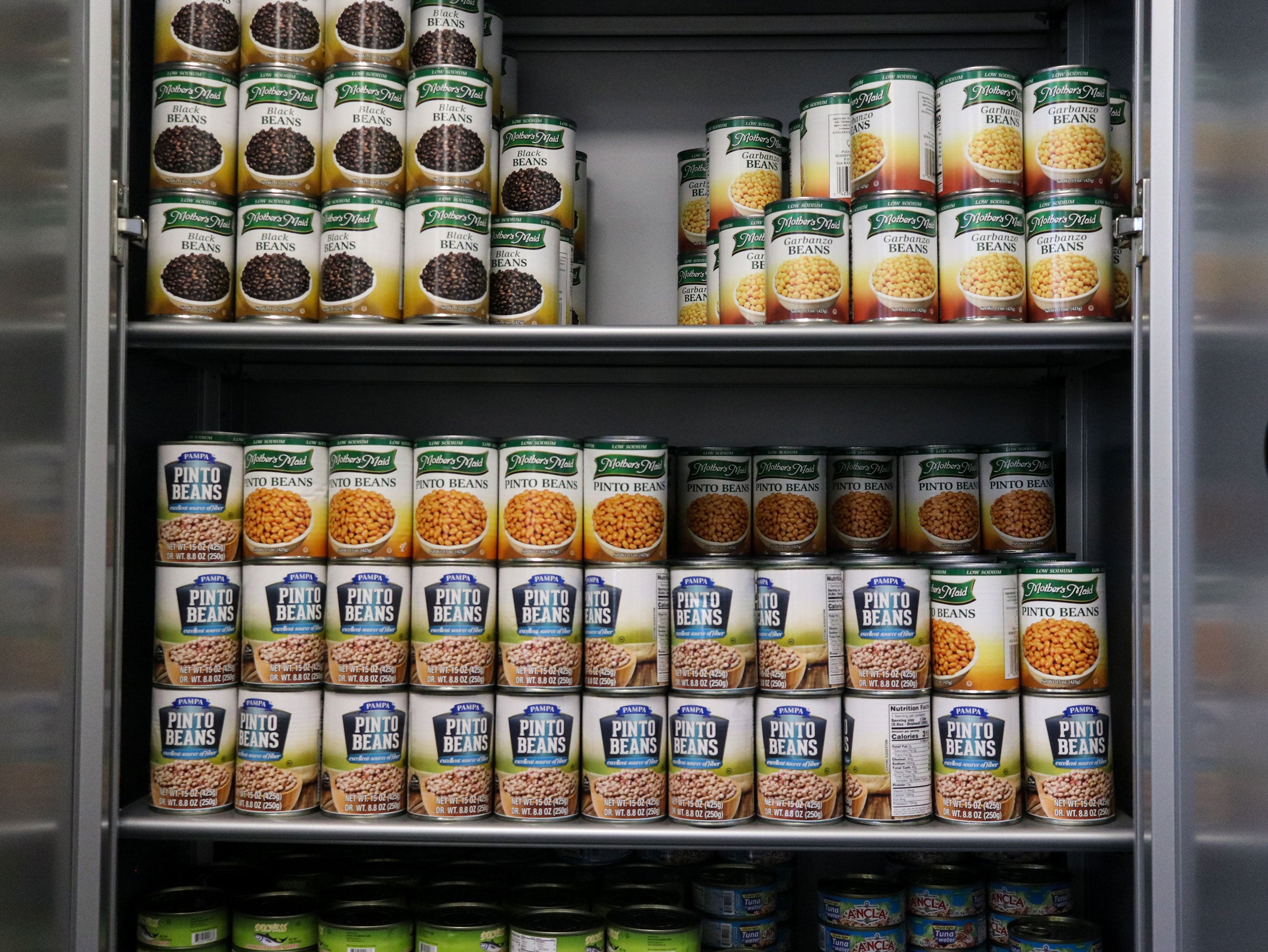
Already, about 500 people have received 2,600 pounds of food, said Iliana Garcia, the pharmacy’s manager. (In recent years, similar pharmacies have popped up in San Francisco and central Pennsylvania.)
Khan, the food pharmacy’s director, doesn’t expect a bag of groceries to change everything. The pharmacy, which runs on grants, is used by a family maybe every couple months. But she hopes it will create more room for conversation.
“Other issues they may be having with paying their bills, with perhaps mother or father struggling with their own health issues, they now find it easier to talk to us about it,” she said. “Because we’re saying, you know, we want to hear about what it’s like to live your life.”
WHYY is your source for fact-based, in-depth journalism and information. As a nonprofit organization, we rely on financial support from readers like you. Please give today.


